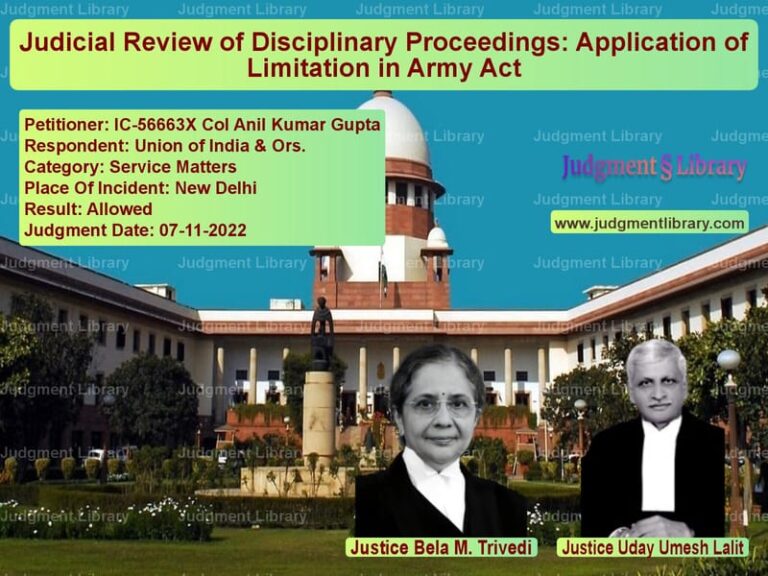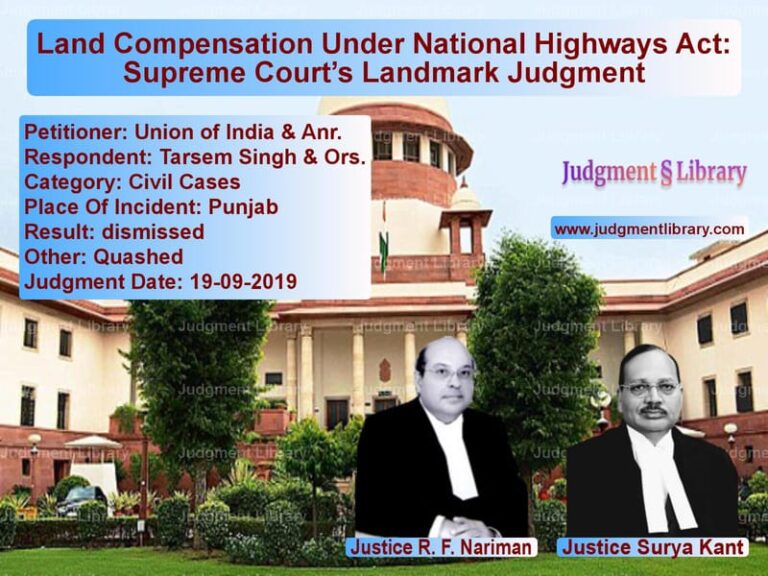Supreme Court Upholds High Court’s Ruling in Property Dispute Over Possession Rights
The Supreme Court of India, in the case of Balasubramanian & Anr. vs. M. Arockiasamy (dead) Through LRs, adjudicated a long-standing property dispute regarding possession and ownership. The case originated from a suit seeking a permanent injunction, which was initially dismissed by the Trial Court but later allowed by the First Appellate Court. The Supreme Court upheld the decision of the Madras High Court, which had reversed the Appellate Court’s order, emphasizing the importance of seeking a declaration of ownership before claiming possession.
Background of the Case
The appellant, Balasubramanian, filed a suit in 1987 before the District Munsif, Palani, seeking a permanent injunction to restrain the defendants from interfering with his possession of the suit property. The dispute revolved around claims of long-term possession versus rightful ownership.
Pleadings by the Plaintiff
- The plaintiff claimed that he had been in possession and enjoyment of the suit property for over 40 years, paying kist (land tax) regularly.
- The defendant had no legal rights over the property, as he had sold his adjacent land to a third party.
- The defendant attempted to trespass onto the suit property, prompting the plaintiff to file the suit for an injunction.
Pleadings by the Defendant
- The defendant denied the plaintiff’s claim of possession and asserted that he was the rightful owner.
- The suit property originally belonged to the defendant’s predecessors, and the plaintiff had no legal claim over it.
- The plaintiff had fraudulently created documents, including tax receipts, to bolster his claim.
Findings of the Trial Court
The Trial Court examined the evidence and ruled against the plaintiff on the following grounds:
- The plaintiff had failed to establish exclusive possession of the suit property.
- The plaintiff had not sought a declaration of title, which was necessary given that ownership was in dispute.
- The defendant’s claim of title was stronger and backed by a lineage of property transactions.
Accordingly, the suit was dismissed on April 13, 1993.
First Appeal Before the District Judge
The plaintiff challenged the Trial Court’s ruling before the District Judge, Dindigul, in A.S. No. 51/1993. The First Appellate Court reversed the Trial Court’s decision, holding that:
- The plaintiff had produced kist receipts, proving payment of taxes for the suit property.
- The Trial Court erred in disregarding these documents, which indicated continuous possession.
- Since the plaintiff was in possession, the defendant’s attempt to interfere was unlawful.
As a result, the First Appellate Court ruled in favor of the plaintiff on March 18, 1994, granting a permanent injunction.
Second Appeal Before the Madras High Court
The defendant challenged the First Appellate Court’s ruling before the Madras High Court, Madurai Bench, in S.A. No. 1303/1994. The High Court framed a substantial question of law:
“Is a suit for permanent injunction maintainable without seeking a declaration of title when the plaintiff’s ownership is disputed?”
The High Court answered this in the negative, holding that:
- Since the defendant disputed ownership, the plaintiff should have sought a declaration of title before asking for an injunction.
- Merely paying land tax does not prove legal possession or ownership.
- The First Appellate Court erred in ignoring the Trial Court’s factual findings.
Thus, the High Court set aside the injunction granted by the First Appellate Court and restored the Trial Court’s judgment on October 30, 2009.
Supreme Court’s Key Observations
1. Necessity of Seeking a Declaration of Ownership
The Supreme Court emphasized that when ownership is contested, a party seeking an injunction must first establish its legal title:
“A suit for bare injunction is not maintainable when the defendant disputes the plaintiff’s title. A declaration of ownership must be sought before an injunction can be granted.”
2. Role of Tax Receipts in Proving Possession
The Court ruled that tax receipts alone do not establish ownership or possession:
“The mere payment of land tax does not confer ownership rights, nor does it conclusively prove possession.”
3. Limited Scope of Second Appeals
The Court reiterated that a Second Appeal under Section 100 of the Civil Procedure Code can only be entertained on substantial questions of law and not for reappreciating factual findings.
Final Judgment
The Supreme Court upheld the High Court’s decision and dismissed the appeal:
- The plaintiff’s suit for an injunction was not maintainable without a declaration of ownership.
- The High Court had correctly interfered to prevent erroneous legal precedent.
- The Trial Court’s findings regarding possession and ownership were restored.
The appeal was dismissed on September 2, 2021, with no order as to costs.
Implications of the Judgment
1. Strengthening Property Litigation Principles
The ruling clarifies that plaintiffs must establish ownership through declaratory relief before seeking an injunction.
2. Reinforcing Judicial Discipline
The judgment underscores that First Appellate Courts cannot ignore factual findings of the Trial Court without valid legal reasoning.
3. Preventing Misuse of Tax Receipts
The Court’s ruling ensures that tax receipts cannot be misused to claim ownership in property disputes.
4. Maintaining the Scope of Second Appeals
The decision reinforces that Second Appeals are limited to questions of law and cannot be used to reassess factual determinations.
Conclusion
The Supreme Court’s judgment in Balasubramanian & Anr. vs. M. Arockiasamy sets a significant precedent in property law. It clarifies that possession alone is insufficient to seek an injunction when ownership is in dispute. The ruling reinforces the necessity of declaratory relief in such cases, preventing baseless claims over land based on tax payments alone.
Petitioner Name: Balasubramanian & Anr..Respondent Name: M. Arockiasamy (dead) Through LRs.Judgment By: Justice N.V. Ramana, Justice A.S. Bopanna, Justice Hrishikesh Roy.Place Of Incident: Palani, Tamil Nadu.Judgment Date: 02-09-2021.
Don’t miss out on the full details! Download the complete judgment in PDF format below and gain valuable insights instantly!
Download Judgment: balasubramanian-&-an-vs-m.-arockiasamy-(dead-supreme-court-of-india-judgment-dated-02-09-2021.pdf
Directly Download Judgment: Directly download this Judgment
See all petitions in Property Disputes
See all petitions in Specific Performance
See all petitions in Landlord-Tenant Disputes
See all petitions in Damages and Compensation
See all petitions in Judgment by N.V. Ramana
See all petitions in Judgment by A. S. Bopanna
See all petitions in Judgment by Hrishikesh Roy
See all petitions in dismissed
See all petitions in supreme court of India judgments September 2021
See all petitions in 2021 judgments
See all posts in Civil Cases Category
See all allowed petitions in Civil Cases Category
See all Dismissed petitions in Civil Cases Category
See all partially allowed petitions in Civil Cases Category







